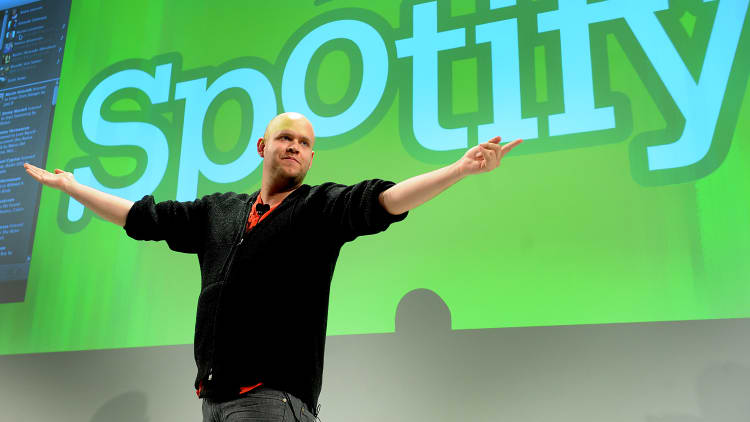Can Spotify upend the IPO market? When Spotify went public April 3, it attracted a lot of interest, and not just because the company was well known to the public. Instead of hiring underwriters to sell new shares to the public, Spotify went public on the NYSE in what is called a "direct listing."
It didn't sell new shares: No bank bought shares from the company and sold them to the public. And (with a few exceptions) there was no lockup period; it didn't try to restrict its employees or investors from selling their shares. As a result, roughly 90 percent of the shares were immediately available to trade.
By almost any standard, the IPO has been a success: After opening at $165.90 on April 3 (above the "reference price" of $132 provided by Morgan Stanley), the stock has traded in a fairly narrow range. The fear that sellers would come out in droves and dump their shares has not materialized, as volume has not been particularly heavy.

This may be due to the fact the company does not have a large institutional share base (outside of Tiger Global Management, which was an original investor). The shares outstanding appear to be traded mostly by retail investors. Institutions will have to report any significant holdings of Spotify in a couple months.
Is this a successful model for other unicorns on the 2018 CNBC Disruptor 50 list announced Tuesday, like Uber and Airbnb or smaller companies?
Perhaps, but only for companies that have a particular set of needs.
1) First and most importantly, Spotify was not seeking to raise additional money; it was primarily interested in allowing existing shareholders (largely employees) to sell shares in the open market.
Most companies are seeking to raise additional money and sell new shares.
2) The company was not concerned that north of 90 percent of the shares would be immediately available to trade. The trading community was: there was considerable uncertainty whether the stock would be unusually volatile in the weeks after it began trading with so many shares available to trade from inside shareholders who had considerable paper profits. Why wasn't trading more volatile? It may be because they had an active private market prior to going public, so there was a release valve all the way into the direct listing. If you were an existing shareholder, whether an employee or a venture capital investor, you already had a path to selling shares.
Most companies do not have this sort of actively traded private market.
3) Spotify was already a brand well-known to the public, making it easier to sell to the retail and institutional community.
Most companies do not have this kind of brand recognition. And that is what Wall Street does: it sells stuff to the investing public for smaller companies in spaces like technology and health care.
So would an Uber or an Airbnb, or a Pinterest, or a Warby Parker — all companies that do have well-known brand names, fit the criteria? The answer is "maybe," according to John Fitzgibbon, who has commented on IPOs for decades with IPO Scoop. "It's not clear if any of those companies would need to raise more money," Fitaxgibbon admitted.
Just don't expect Wall Street to talk it up as a viable option: "There's very little payday for Wall Street in a direct listing."
Spotify did appear to save some money on its direct listing, though how much would have depended on the size of the offering and the deal they were able to negotiate. They reportedly paid roughly $35 million in fees.
Is that a little, or a lot?
It's value on going public was roughly $28 billion. Had they floated 10 percent of the company and sold $2.8 billion in new stock, they would have paid $196 million in fees at seven percent of the amount raised, which is often cited as a norm that Wall Street shoots for. Even a more reasonable 3.5 percent fee (that would likely be charged for a larger IPO, say over $500 million raised) would have cost $98 million, so it does appear they likely paid less than they would have floating even a small part of the company.
More from CNBC Disruptor 50:
SpaceX leading the space race to launch humans to Mars by 2019
The most important delivery breakthrough since Amazon Prime may come from Rwanda
23andMe founder Anne Wojcicki is leading DNA revolution by going directly to consumers
The good news for investors is that many unicorns on our CNBC Disruptor list could hit the button to go public this year, including Airbnb, Uber, Pinterest, Didi, Lyft, Palantir, and SpaceX, providing an exit strategy for inside investors and venture capitalists who have been waiting for years to monetize their investments. A few factors may encourage these companies to go public now: public investors are hungry for shares in fast-growing companies, and many founders are likely eager to cash in and prove themselves as public CEOs.







